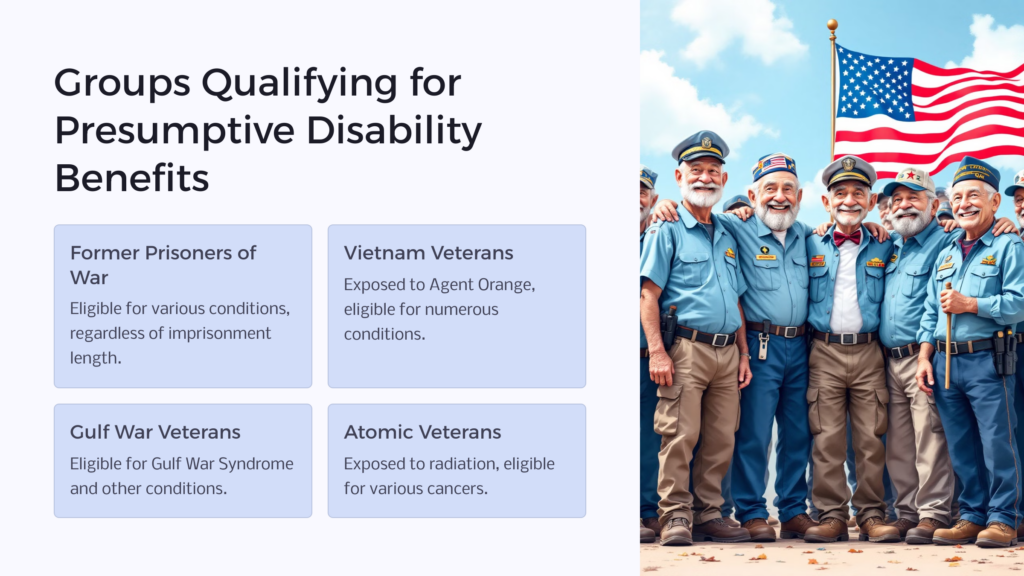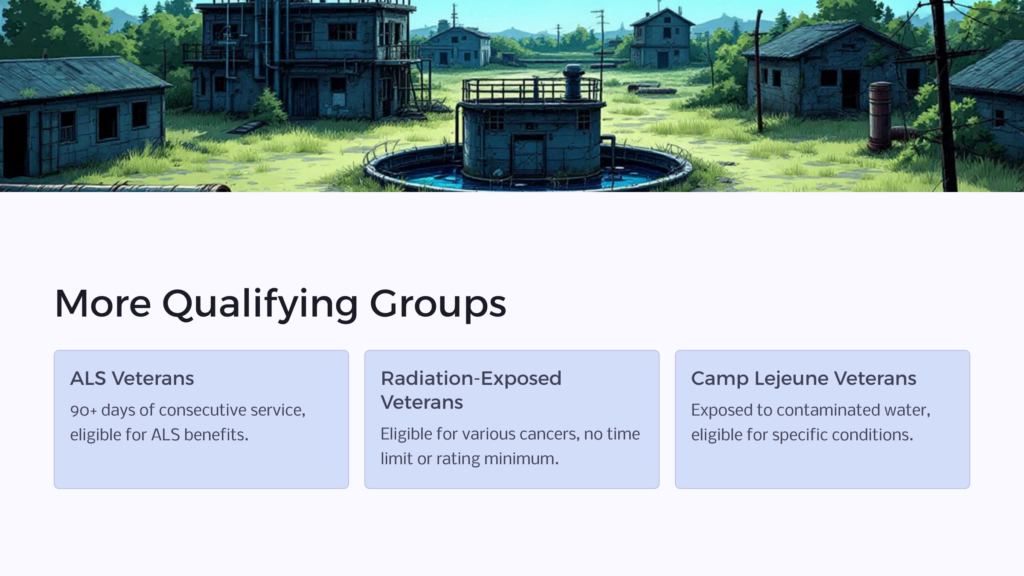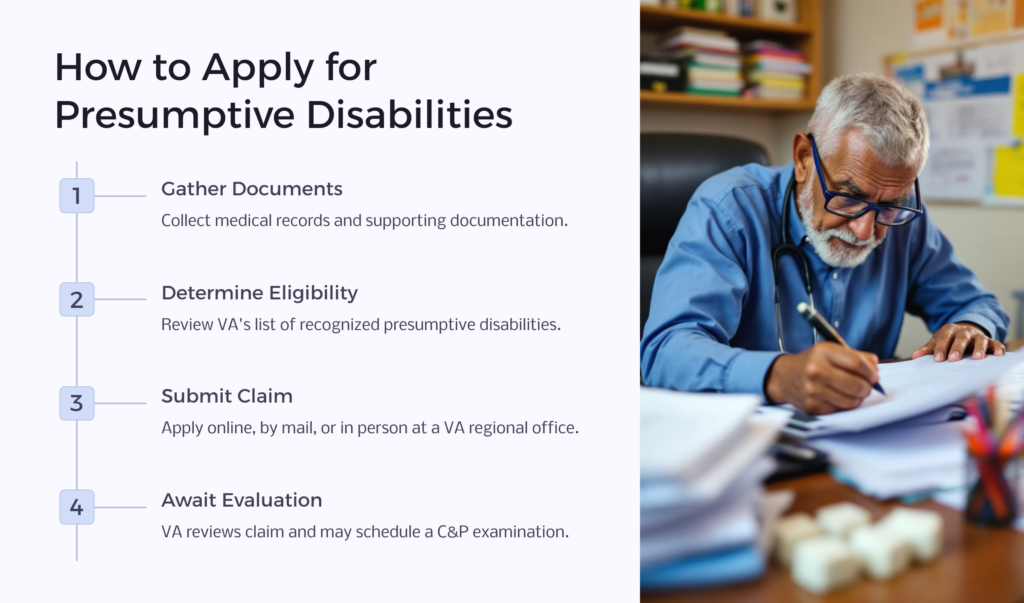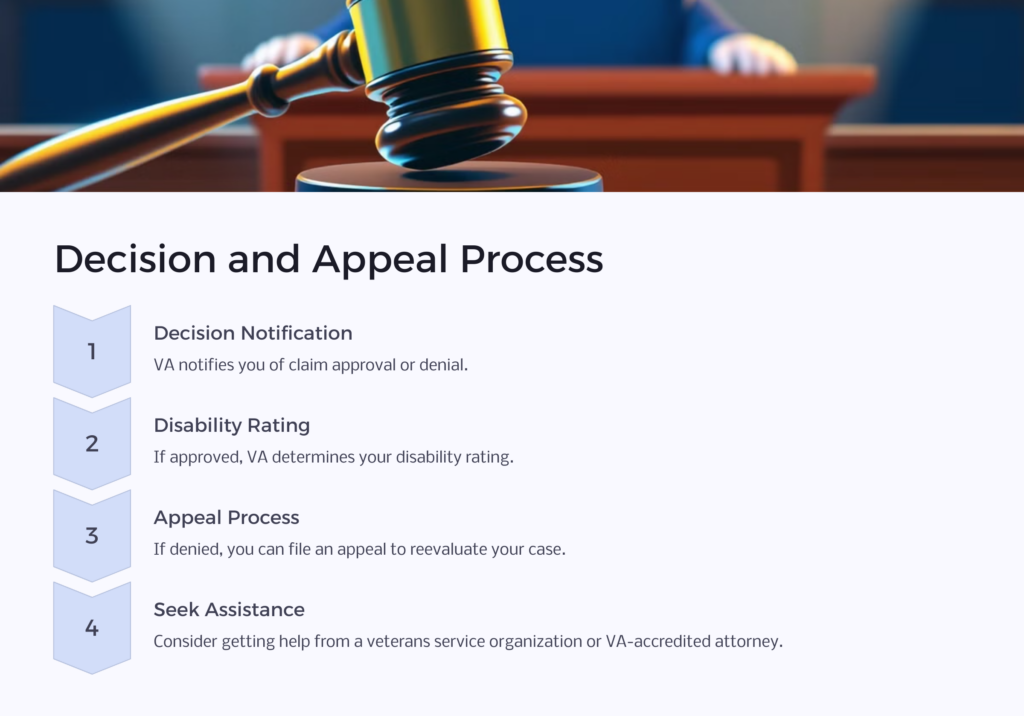In some cases, the nature of a U.S. veteran’s time of military service may lead the U.S. Department of Veterans Affairs to recognize that the veteran’s current disability is likely service-connected. The veteran’s claim for VA disability benefits would be approved because the VA begins the review by presuming that specific disabilities diagnosed in certain veterans were caused or worsened by their military service.
7 Groups Who Qualify for Presumptive Disability Benefits
- Former Prisoners of War
- Vietnam Veterans
- Gulf War Veterans
- Atomic Veterans
- For ALS – Veterans With At Least 90 Days of Consecutive Service
- Veterans Exposed to Radiation
- Veterans Exposed to Toxic Drinking Water at Camp Lejeune
To streamline the VA disability claim process, the VA has developed a standard list of presumptive disabilities. Over time, VA reviewers have recognized that high numbers of veterans serving in a particular location or over a particular timeframe have developed many of the same medical conditions.
If a veteran’s VA disability claim shows that the VA has received a diagnosis on the presumptive disabilities list, it becomes much easier for the veteran to be approved for VA disability benefits. The VA operates under the assumption that the specific nature of the veteran’s time of service is likely to have created a service connection with the veteran’s current medical condition.
What Is a Presumptive Disability?
A presumptive disability is a medical condition defined by the VA as likely to be connected to military service that meets its strict requirements. It’s important to keep in mind that a service connection is one of the most important eligibility criteria for a VA disability claim. Over years of examining various claims, the VA has recognized that some specific service characteristics have a clear and historical connection to a collection of medical conditions.
So, if a veteran files a claim for one of those conditions and also meets the military service requirements associated with that medical condition, it can be considered a presumptive disability. At this point, the veteran isn’t required to prove a service connection, nor does a service connection need to be documented in any of the veteran’s submitted medical evidence. The VA may “presumably” grant disability compensation without a documented service connection.
However, the veteran does need to provide a documented medical diagnosis. In many cases, the medical condition must be diagnosed within a year of leaving military service, and most presumptive disability criteria require the veteran to have completed at least 90 days of active duty military service. In addition, the veteran’s disability usually must be rated at 10% or higher by the VA in order to qualify.
What Is Presumption of Exposure?
Presumption of exposure is when the VA presumes that a veteran was exposed to certain toxic chemicals or other environmental hazards if their time of military service meets specific criteria – such as occurring during a certain time period or in a certain location. For example, Vietnam War veterans are presumed to have been exposed to Agent Orange.
In cases of presumptive disability, the VA allows the presumptive military exposure to establish a service connection between the veteran’s current medical condition and the time of military service.
What Is Presumption of Service Connection?
The presumptive service connection refers to a specific disability that the VA assumes is “as likely as not” connected to military service. It serves as a substitute for the medical nexus opinion the VA normally would require to establish a service connection.
If a veteran meets the specific criteria, then the VA will assume an automatic service connection without the requirement of the medical nexus opinion. However, the veteran still must submit a medical diagnosis.
7 Groups Who Qualify for Presumptive Disability Benefits
The VA recognizes that some groups may automatically qualify for presumptive service connections because of the unique nature of their service.

1. Former Prisoners of War
Former prisoners of war who are diagnosed with a medical condition that receives at least a 10% VA rating can be approved for several presumptive disabilities. For a former POW imprisoned for any length of time, presumptive disabilities include anxiety disorders, psychoses, dysthymic disorder, depressive neurosis, post-traumatic osteoarthritis, stroke, organic residuals of frostbite, and osteoporosis. Heart disease and hypertensive vascular disease are also common when accompanied by post-traumatic stress disorder.
For former prisoners of war who were imprisoned for more than 30 days, presumptive conditions include cirrhosis of the liver, osteoporosis, peripheral neuropathy, irritable bowel syndrome, beriberi and beriberi heart disease, pellagra, chronic dysentery, helminthiasis, peptic ulcer disease, avitaminosis, and a whole host of other nutritional deficiencies.
Former prisoners of war represent a unique group because the VA generally does not require that their medical conditions be diagnosed within a year of separating from military service.
2. Vietnam Veterans
Veterans of the Vietnam conflict who were exposed to the chemical Agent Orange or who served in Vietnam or Cambodia between Jan. 9, 1962, and May 7, 1975, may be approved for VA disability compensation for the following presumptive conditions:
- AL amyloidosis
- B-cell leukemia
- Bladder cancer
- Chronic lymphocytic leukemia
- Hodgkin’s disease
- Hypothyroidism
- Ischemic heart disease – including, but not limited to, coronary artery disease and atherosclerotic cardiovascular disease
- Multiple myeloma
- Non-Hodgkin’s lymphoma
- Parkinson’s disease
- Parkinsonism
- Prostate cancer
- Respiratory cancers
- Soft-tissue sarcoma – not including osteosarcoma, chondrosarcoma, Kaposi’s sarcoma, or mesothelioma
- Type 2 diabetes
In addition, if any of the following become rated at greater than 10% debilitating within a year of exposure to an herbicide agent, they may be considered presumptive disabilities: acute and subacute peripheral neuropathy, chloracne or other similar acneform diseases, or porphyria cutanea tarda (PCT).
The VA generally considers that veterans who served in Vietnam during the timeframe outlined here were exposed to Agent Orange at some level, which opens the door for many medical issues to be considered presumptive disabilities for those veterans.
3. Gulf War Veterans
Many veterans who served in the Gulf War have since developed a series of mysterious illnesses, which can make them eligible for VA disability benefits under presumptive disability guidelines.
Gulf War veterans are eligible if they served any length of time in the Southwest theater of operations during the Persian Gulf War or who served for any length of time in Afghanistan, Syria, Djibouti, or Uzbekistan on or after September 19, 2001.
They must also show symptoms of any one of the following to any degree within 10 years from the date of separation from military service. These veterans are typically eligible for VA disability benefits based on a presumptive disability: asthma, allergic rhinitis, or sinusitis – which also includes rhinosinusitis.
Gulf War veterans who served in the Southwest Asia theater of operations or in Afghanistan on or after September 19, 2001 are also eligible for VA disability benefits based on a presumptive disability. Eligible veterans must be diagnosed with one of the following medical conditions with a VA rating of at least 10% within one year of separating from service:
- Brucellosis
- Campylobacter jejuni
- Coxiella burnetii (Q fever)
- Nontyphoid Salmonella
- Shigella
- West Nile virus
- Malaria
- Mycobacterium Tuberculosis
- Visceral leishmaniasis
Gulf War Syndrome
Gulf War veterans who served in the Southwest Asia theater of operations may also be eligible for VA disability benefits based on presumptive disability. Veterans must be diagnosed with a medical condition that is rated at least 10% disabling by Dec. 31, 2026.
This category is designed to address what has become known as Gulf War Syndrome, an illness that can’t be clinically diagnosed, but continues to cause health issues for veterans of Gulf War conflicts. According to the VA, there is no primary known cause for the symptoms associated with Gulf War Syndrome – which include fatigue, headaches, and joint or muscle pain – but it is classified as a presumptive condition. Many Gulf War veterans suffer repercussions from being exposed to military burn pits as well.
For this category of presumptive disability, medical conditions include medically unexplained, chronic, multi-symptom illnesses that exist for six months or more. Conditions can include chronic fatigue syndrome, fibromyalgia, irritable bowel syndrome, or any diagnosed or undiagnosed illness that warrants a presumption of service connection – as defined by the Secretary of Veterans Affairs.
4. Atomic Veterans

Many atomic veterans who meet the following criteria may receive VA disability compensation or several presumptive disabilities:
- Occupied or were prisoners of war in Hiroshima or Nagasaki
- Participated in atmospheric nuclear testing
- Served before Feb. 1, 1992, at a diffusion plant in Paducah, Kentucky, Portsmouth, Ohio, or Oak Ridge, Tennessee
- Served before Jan. 1, 1974, at Amchitka Island, Alaska
Presumptive disabilities for these veterans include many forms of cancer and all forms of leukemia, except for chronic lymphocytic leukemia. Types of cancer include thyroid, breast, pharynx, esophagus, stomach, small intestine, pancreas, bile ducts, gallbladder, salivary gland, urinary tract, brain, bone, lung, colon, ovary, and more.

5. ALS – Veterans With At Least 90 Days of Consecutive Service
When it comes specifically to amyotrophic lateral sclerosis (ALS), also known as Lou Gehrig’s disease, veterans who show active, continuous service of 90 days or more generally are presumed to have developed the disease as a result of their military service.
If the disease manifests at any point after separation from qualifying active service, this typically is viewed by the VA as sufficient for establishing a service connection for the disease, and no further medical evidence is required to establish a service connection.
6. Veterans Exposed to Radiation
Veterans who were exposed to radiation during military service also could be eligible for VA benefits under the presumptive disability approach. Eligibility for presumptive conditions benefits depends on the specifics of their military service. For example, prisoners of war held near Hiroshima or Nagasaki during World War II, or anyone located less than 10 miles off the coast of these areas during the bombing, are eligible.
Common conditions covered for veterans who were exposed to radiation include cancer of the brain, bone, liver, stomach, breast, thyroid, pharynx, salivary gland, small intestine, pancreas, colon cancer, and other cancers, and leukemia – with the exception of chronic lymphocytic leukemia. It’s important to note that for veterans exposed to radiation, the VA has stipulated no time limit on these conditions, and the minimum 10% disability rating does not apply.
7. Veterans Exposed to Toxic Drinking Water at Camp Lejeune
Members of the U.S. military, and their families, who lived or worked at the U.S. Marine Corps base camp in Lejeune, North Carolina, between August 1, 1953, and December 31, 1987, were exposed to drinking water contaminated with a variety of toxic chemicals. Those veterans may be eligible for VA disability benefits if they develop any of a series of medical conditions including aplastic anemia, bladder cancer, kidney cancer, leukemia, non-Hodgkin’s lymphoma, Parkinson’s disease, and multiple myeloma.
In addition, veterans who were exposed to Camp Lejeune water contamination beginning January 1, 1957, also may be eligible for free VA healthcare. Veterans suffering from various cancers, hepatic steatosis, myelodysplastic syndromes, renal toxicity, or scleroderma typically are eligible.
How to Apply for Presumptive Disabilities

To apply for presumptive disability as a veteran, you need to follow these steps:
1. Gather necessary documents: Collect all relevant medical records and documentation that support your claim for presumptive disability. This may include medical records, test results, diagnosis reports, and other documentation verifying your condition.
2. Determine eligibility: Review the list of presumptive disabilities the VA recognizes to determine if your condition qualifies. Presumptive disabilities are presumed to be service-connected without the need to prove a direct connection. The VA maintains a list of conditions, such as certain chronic diseases, considered presumptive disabilities.
3. Submit a claim: There are multiple ways to apply for presumptive disability benefits:
a. Online: You can apply through the VA’s eBenefits portal. Create an account, navigate to the Disability Compensation section, and follow the application instructions.
b. By mail: Complete VA Form 21-526EZ (AKA the Application for Disability Compensation and Related Compensation Benefits). Attach all supporting documentation and mail it to the appropriate VA regional office. You can find the address on the VA’s website or by contacting the VA directly.
c. In person: Visit your nearest VA regional office and complete the application. Bring all necessary documents with you to submit along with the application.
4. Await evaluation: After submitting your application, the VA will review your claim and may schedule a Compensation & Pension (C&P) examination to evaluate your condition further. The C&P exam is conducted by a VA healthcare professional or a contracted examiner.

5. Decision and notification: Once the VA completes its evaluation, you will receive a decision regarding your claim. If approved, the VA will determine your disability rating, which determines the level of compensation you will receive. If denied, you have the right to appeal the decision.
6. Appeal process: If your claim is denied, you can file an appeal to reevaluate your case. The appeals process involves several steps and can be complex. It is advisable to seek assistance from a veterans service organization or a VA-accredited attorney or claims agent to guide you through the appeals process.
Remember, each case is unique, and it’s important to consult with
professional or reach out to the VA for personalized guidance during the application process.
Understanding Presumptive Disabilities
As early as during World War I, the United States began to recognize that the burden of proof and responsibility for veterans who apply for VA disability benefits is often quite onerous and difficult to meet. Over time, the VA has established and refined its list of specifically defined service parameters and the medical conditions presumed to be connected to those terms of service.
If you think your current medical condition falls into the category of a presumptive disability, you should gather your documentation and file a claim for VA disability benefits as soon as you can. You owe it to yourself to make sure you get access to the benefits you’ve earned through your service to your country.
 Benefits.com Advisors
Benefits.com Advisors
With expertise spanning local, state, and federal benefit programs, our team is dedicated to guiding individuals towards the perfect program tailored to their unique circumstances.
Rise to the top with Peak Benefits!
Join our Peak Benefits Newsletter for the latest news, resources, and offers on all things government benefits.



















